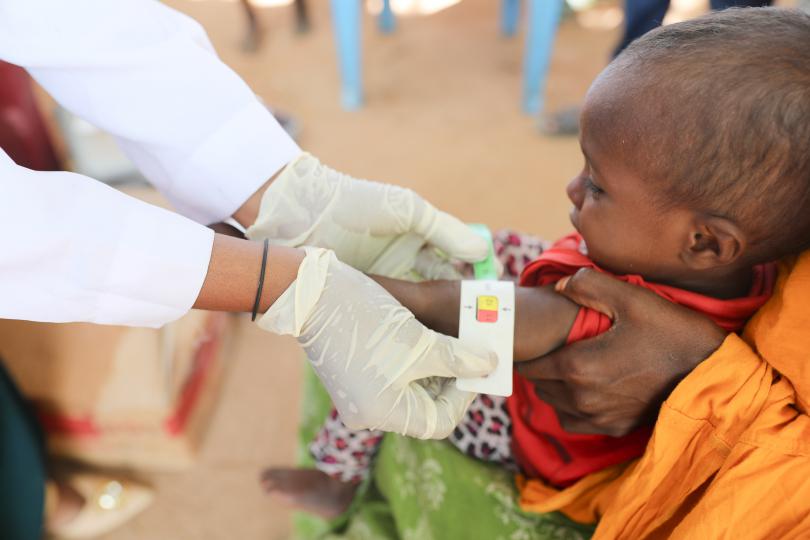Halima’s Fight Against Malnutrition

Story summary
Halima*, a 23-year-old mother of two, lives in an internally displaced persons (IDP) camp in the Liban Zone of the Somali Region in Ethiopia. Four years ago, she and her family fled conflict in the neighboring Oromia region and sought refuge in the Somali region. It was in the IDP camp that Halima met her husband, and together they have built a life, welcoming two children into their family.
Life in the IDP camp has presented significant challenges for Halima and her family. Her husband, who works as a daily laborer, is the sole provider for the family. Despite his efforts, meeting their basic needs has been an ongoing struggle, specially as their family grows. Unfortunately, their hardships have been compounded by their second son being diagnosed with malnutrition.
Halima brought her son to the mobile health clinic set up by Save the Children, with financial support from the Italian Agency for Development Cooperation (AICS). She took this step when her son began vomiting, had diarrhea, and became weak. The mobile health team treated him for severe acute malnutrition (SAM). We met Halima and her son at the clinic during his second-round follow-up and vaccination.
The IDP community have been receiving essential healthcare services from the mobile health clinic including vaccination, basic medical examinations, medications, and follow-up care. Additionally, pregnant mothers receive nutrition support, while children who are at risk of being underweight are provided with specialized care and attention. The mobile health clinic was established by Save the Children with the funding support from Italian Agency for Development Cooperation (AICS).
Halima’s story in her own words (Quotes)
"My name is Halima, and I am 23 years old. I have two children. For the past four years, my family and I have been displaced. We were living in Negele when conflict erupted, forcing us to flee for our safety to Dollo Ado.”
“My husband works as a daily laborer, and we often struggle to afford healthcare expenses. Thankfully, we have access to a clinic that provides free services now. They visit our IDP camp every Monday, ensuring we receive the care we need without financial burden.”
“I'm here today to follow up on my second baby's vaccinations and to collect his plum nuts (peanut paste) that he will be eating for a week. My baby fell ill, experiencing vomiting and diarrhea, so I rushed him to the mobile health team for immediate care. My son’s health is improving, I have seen progress in his weight, and he is now playing and moving round the house with his brother and Allah willing, he will be fully recovered soon.”
“The service provided by the clinic is incredibly crucial to me. During my second pregnancy, they followed me closely, providing essential vitamins and ensuring regular vaccinations for myself and my child, and medicines for various diseases amongst the community. My family heavily relies on their services."

Background / Project information
Protecting livelihoods assets, promoting positive health practices, and reducing malnutrition in drought-affected areas of the Somali region (Ethiopia) is a project that aims to save lives, protect livelihoods assets, and reduce malnutrition. It targets the most vulnerable host and IDP households affected by prolonged droughts in the region. Integrated FSL, health and nutrition programming linked to relevant services maximizes impact on vulnerable people in need. The project’s targeted areas are overlapped purposely to ensure access to multi-sectoral services and to multiply the impact of the project. Nutrition is the entry point for Food Security and Livelihoods (FSL) interventions, targeting pregnant and lactating women (PLW) and children under five as well as women affected by acute malnutrition. The multi-purpose cash transfers cover vulnerable household’s basic needs and prevent them from resorting to negative coping strategies, notably affecting the nutritional status of children and PLW. In addition to the monthly transfer of multi-purpose cash and income generation activities (IGA) assistance, Save the Children provides its project participants with nutrition support, consisting of case management, referral system, infant and young children feeding (IYCF), social behavioral change communication (SBCC) on issues such as IYCF practices, health seeking, and nutrition and hygiene and sanitation promotion sessions for PLW, mothers and caretakers. The health response at community and facility level compliments FSL and nutrition response by availing referral systems. Caretakers with identified malnutrition cases but unable to cover transportation service costs to service points use service vouchers for their work. The community and facility level health services helps prevent communicable diseases that deteriorate nutritional statuses of PLW and children, in addition to protecting families from additional health service costs.




